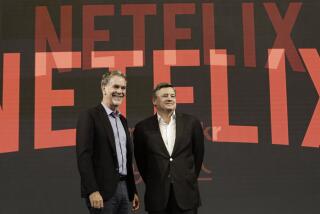Nintendo Struggles for Victory of Old
- Share via
Hoping to avoid getting clocked like Mario by an anvil, video game maker Nintendo Co. on Wednesday slashed the price of its flagship GameCube console by a third, to less than $100.
The aggressive move highlights how far the Japanese company, whose name was once synonymous with video games, has fallen in recent years -- from a position of overwhelming dominance to a distant last place in the U.S. market, which accounts for more than a third of global game sales.
Worldwide, Nintendo still claims second place, behind Sony Corp.
But in North America, Sony and Microsoft Corp. have pounded Nintendo with more-powerful machines and a broader range of games, capturing teenage and twentysomething gamers who spend more than the younger children to whom Nintendo traditionally has appealed.
Executives at Sony, which sells its PlayStation 2 console for $179, said it would not match Nintendo’s price cut. Microsoft said it would keep the Xbox’s price at $179. The GameCube is now the same price as Nintendo’s ubiquitous hand-held game device, Game Boy Advance SP.
Nintendo executives said the price reduction would boost market share.
“We believe this is a mass-market price point,” said George Harrison, senior vice president of marketing for Nintendo’s U.S. operations. “This should grow our unit market share from under 20% of consoles to the high 20s by the end of the year.”
That still would be a far cry from the 90% market share Nintendo enjoyed in the late 1980s and early 1990s with its NES and Super NES consoles.
In Nintendo’s 2003 fiscal year, which ended in March, sales fell 9% from the year before, to $4.2 billion. Profit fell 37% to $561 million. At the same time, the game industry grew by double-digits to more than $25 billion in worldwide sales.
Analysts said a price cut may not be enough because casual players tend to buy fewer titles than do hard-core gamers. Nintendo, they added, also must bolster its library of games.
“They need to improve the quality of their games,” said Billy Pidgeon, senior analyst with Zelos Group in New York. “They need to work on their relationships with third-party game publishers to develop more exclusive titles.”
Eidos, British creator of the Lara Croft “Tomb Raider” franchise, recently said it would no longer make games for the GameCube. Take-Two Interactive Software Inc. in New York last year committed to publishing its “Grand Theft Auto” series exclusively on PlayStation 2 for the next several years.
“Publishers are being more selective over what they will develop for the GameCube,” said P.J. McNealy, analyst with American Technology Research in San Francisco.
Afraid of being pigeonholed into a narrow market, Nintendo has struggled against its image as a maker of kids’ toys. Last year, the company spent $125 million to market its products to an older U.S. audience. And this year, the company plans to spend $100 million on marketing.
“Their strategy for going after the older market didn’t work that well,” Pidgeon said. “There’s still a perception that they skew younger.”
Nintendo has some significant strengths. Its Game Boy Advance dominates the hand-held games market, although Sony plans to invade that niche next year with its pocket-sized PSP game, music and movie player.
And while Microsoft loses money on its Xbox business, Nintendo remains profitable.
The company also has $6 billion in cash, more than enough to finance development of its next console.
Nintendo has vigorously denied rumors that it would drop out of the hardware business to focus on games, following the example of another video game legend, Sega Corp. Strapped for cash, Sega two years ago killed its Dreamcast console business and opted to make games for PS2 and Xbox.
But Nintendo has vowed to play in the next round of console wars, expected to begin in 2005 or 2006.
“We’re already under way with development for our next console,” Harrison said.
*
(BEGIN TEXT OF INFOBOX)
Played out?
GameCube launched: 2001
Original price: $199
New price: $99.99
Nintendo’s market share in the 1980s: 90%, with NES and Super NES consoles.
Market share now: Less than 20% of consoles in U.S. market, behind PlayStation 2 and Xbox.
Consoles* in U.S. homes:
* PlayStation 2: 18.7 million
* Xbox: 5.8 million
* GameCube: 4.7 million
*As of March 2002
Source: NPD, Times research
Los Angeles Times





